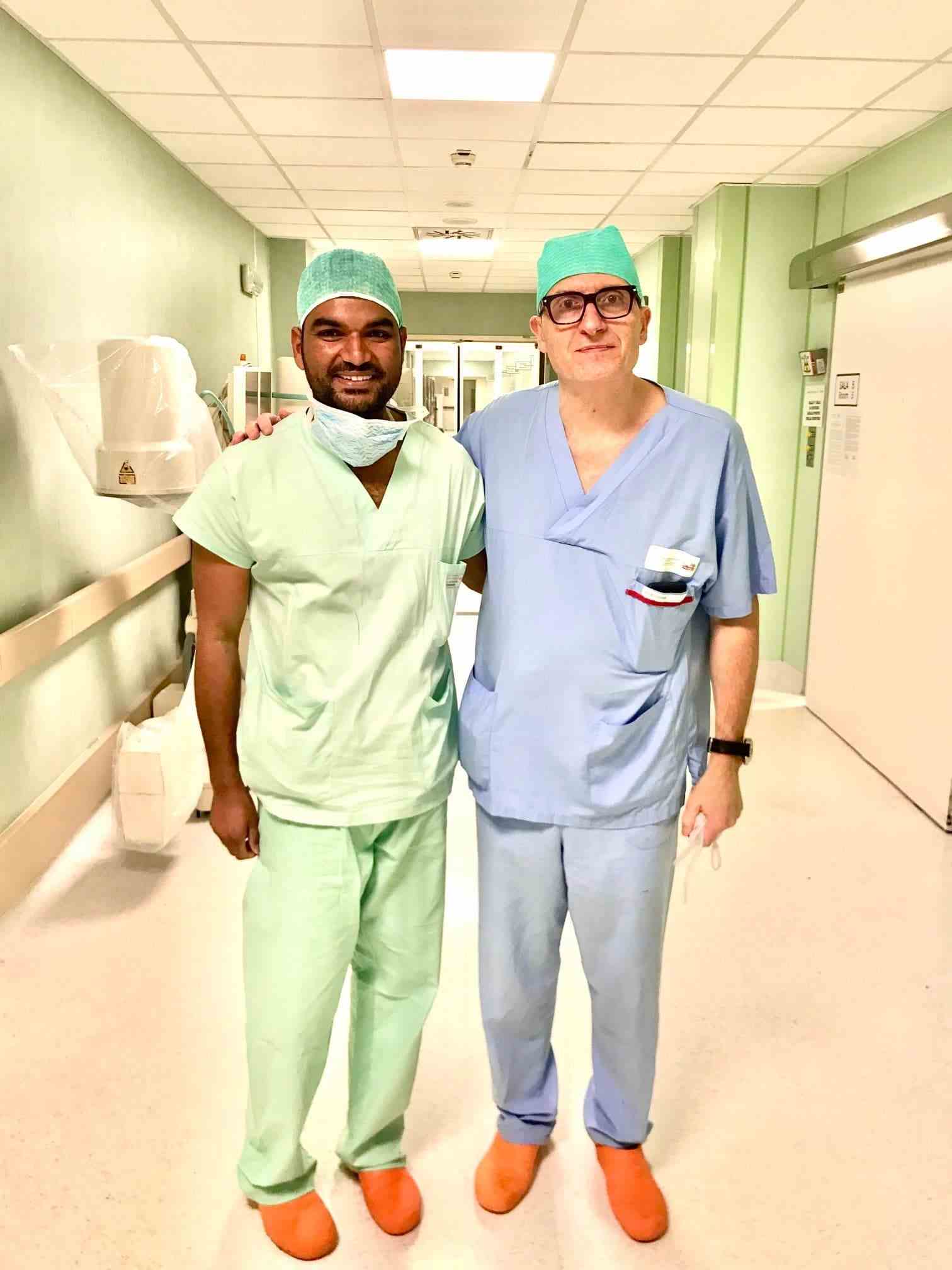Best Knee Replacement in Jaipur: How to Find the Right Surgeon for Your Needs
Body
Knee pain is a common complaint among individuals of all ages. Whether it's due to an injury, overuse, or a chronic condition, finding an effective treatment is crucial for improving your quality of life. This blog post will explore the various treatment options available to patients with knee pain or disorders, providing a comprehensive overview of the different approaches.
1. Physical Therapy: Physical therapy is often the first line of treatment for knee pain. A qualified therapist will guide you through exercises and stretches that can help strengthen the muscles around your knee, improving stability and reducing pain.
2. Medications: Nonsteroidal anti-inflammatory drugs (NSAIDs) such as ibuprofen can provide temporary relief from knee pain by reducing inflammation. In some cases, your doctor may also prescribe stronger pain medications or corticosteroid injections to alleviate severe pain.
3. Bracing: Knee braces can provide support and stability to the affected joint, reducing pain and preventing further injury. Depending on the severity of your condition, your doctor may recommend a specific type of brace that suits your needs.
4. Injections: In addition to corticosteroid injections, other types of injections can help with knee pain. For example, hyaluronic acid injections can provide lubrication to the joint, reducing friction and improving mobility.
5. Surgical Interventions: In cases where conservative treatments fail to provide relief, surgical interventions may be necessary. Arthroscopy, knee replacement in Jaipur, and meniscus repair are some of the surgical options available to patients with knee pain or disorders. These procedures aim to repair damaged tissues, alleviate pain, and improve overall joint function.
6. Regenerative Medicine: Regenerative medicine is a growing field that aims to promote the body's natural healing processes. Treatments such as platelet-rich plasma (PRP) therapy and stem cell therapy have shown promising results in reducing pain and promoting tissue regeneration in patients with knee pain or disorders.
7. Lifestyle Modifications: Making certain lifestyle modifications can also help manage knee pain. Maintaining a healthy weight can reduce stress on the knee joint while engaging in low-impact exercises like swimming or cycling can improve strength and flexibility without putting excessive strain on the knee.
8. Alternative Therapies: Some patients may find relief from knee pain through alternative therapies such as acupuncture, chiropractic care, or massage therapy. While the effectiveness of these treatments may vary from person to person, they can be worth exploring as part of a comprehensive treatment plan.
It's important to note that every patient is unique, and the most appropriate treatment approach will depend on the underlying cause and severity of the knee pain or disorder. It is crucial to consult with a qualified healthcare professional who specializes in orthopedics or sports medicine to determine the best course of action for your specific situation.
In conclusion, there are several treatment options available to patients with knee pain or disorders. From physical therapy and medications to surgical interventions and regenerative medicine, a comprehensive approach can provide relief and improve the quality of life for individuals experiencing knee pain. It is essential to consult with a healthcare professional to determine the most suitable treatment plan based on the underlying cause and severity of the condition. Remember, every patient is unique, and a personalized approach is crucial for achieving positive outcomes.
Physical therapy is often the first line of treatment for knee pain. A qualified therapist can guide you through exercises and stretches that strengthen the muscles around your knee, enhancing stability and reducing pain. This approach focuses on improving mobility, functionality, and overall joint health.
Medications, such as nonsteroidal anti-inflammatory drugs (NSAIDs) like ibuprofen, can provide temporary relief by reducing inflammation. In some cases, stronger pain medications or corticosteroid injections may be prescribed to alleviate severe pain. These interventions aim to manage pain and improve daily functioning.
Knee braces are another treatment option that can provide support and stability to the affected joint. Depending on the severity of the condition, your doctor may recommend a specific type of brace that suits your needs. Braces help reduce pain, prevent further injury, and aid in the recovery process.
Injections, such as corticosteroid injections or hyaluronic acid injections, can also be beneficial for knee pain. Corticosteroid injections target inflammation and pain, providing relief for a certain period. Hyaluronic acid injections, on the other hand, provide lubrication to the joint, reducing friction and improving mobility.
Surgical interventions may be necessary in cases where conservative treatments fail to provide relief. Arthroscopy, Best knee replacement surgery, and meniscus repair are some of the surgical options available to patients with knee pain or disorders. These procedures aim to repair damaged tissues, alleviate pain, and improve overall joint function. It's important to note that surgical interventions are typically reserved for more severe cases and should be considered as a last resort.
Regenerative medicine is an emerging field that offers promising results for patients with knee pain or disorders. Treatments such as platelet-rich plasma (PRP) therapy and stem cell therapy can promote the body's natural healing processes and aid in tissue regeneration. These innovative treatments have shown potential in reducing pain and improving joint function.
In addition to medical interventions, making certain lifestyle modifications can also play a significant role in managing knee pain. Maintaining a healthy weight can reduce stress on the knee joint while engaging in low-impact exercises like swimming or cycling can improve strength and flexibility without putting excessive strain on the knee. It's important to find a balance between rest and activity to avoid exacerbating the pain.
Alternative therapies such as acupuncture, chiropractic care, or massage therapy may also provide relief for some patients. While the effectiveness of these treatments may vary from person to person, they can be worth exploring as part of a comprehensive treatment plan. It's important to discuss these options with a healthcare professional to determine if they are suitable for your specific situation.
In conclusion, there are several treatment options available to patients with knee pain or disorders. From physical therapy and medications to surgical interventions and regenerative medicine, a comprehensive approach can provide relief and improve the quality of life for individuals experiencing knee pain. It is important to consult with a qualified healthcare professional who specializes in orthopedics or sports medicine to determine the best reaction for your specific situation. Remember, every patient is unique, and a personalized approach is crucial for achieving positive outcomes.
Physical therapy is often the t line of treatment for knee pain. A qualified therapist can guide you through exercises and stretches that strengthen the muscles around your knee, enhancing stability and reducing pain. This approach focuses on improving mobility, functionality, and overall joint health.
Revision Total Knee Replacement can provide support and stability to the affected joint. Depending on the severity of the condition, your doctor may recommend a specific type of brace that suits your needs. Braces help reduce pain, prevent further injury, and aid in the recovery process.
Injections, such as corticosteroid injections or hyaluronic acid injections, can also be beneficial for knee pain. Corticosteroid injections target inflammation and pain, providing relief for a certain period. Hyaluronic acid injections, on the other hand, provide lubrication to the joint, reducing friction and improving mobility.
Surgical interventions may be necessary for pain or disorders. These procedures aim to repair damaged tissues, alleviate pain, and improve overall joint function.
Regenerative medicine is an emerging field that offers promising results in the treatment of knee pain or disorders. Treatments such as platelet-rich plasma (PRP) therapy and stem cell therapy can promote tissue regeneration and reduce pain. These therapies harness the body's natural healing processes to provide long-term relief and improve joint function.
Lifestyle modifications can also play a significant role in managing knee pain. Maintaining a healthy weight can reduce stress on the knee joint while engaging in low-impact exercises like swimming or cycling can improve strength and flexibility without putting excessive strain on the knee. Additionally, avoiding activities that exacerbate the pain and using assistive devices like walking aids or shoe inserts can help alleviate symptoms.
Some patients may find relief from knee pain through alternative therapies such as acupuncture, chiropractic care, or massage therapy. While the effectiveness of these treatments may vary from person to person, they can be worth exploring as part of a comprehensive treatment plan.












Comments